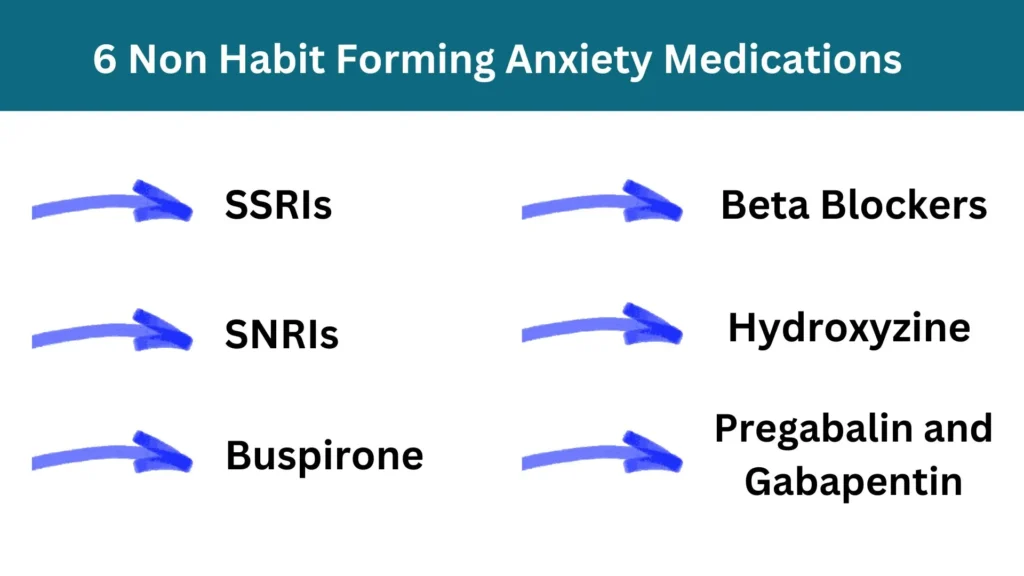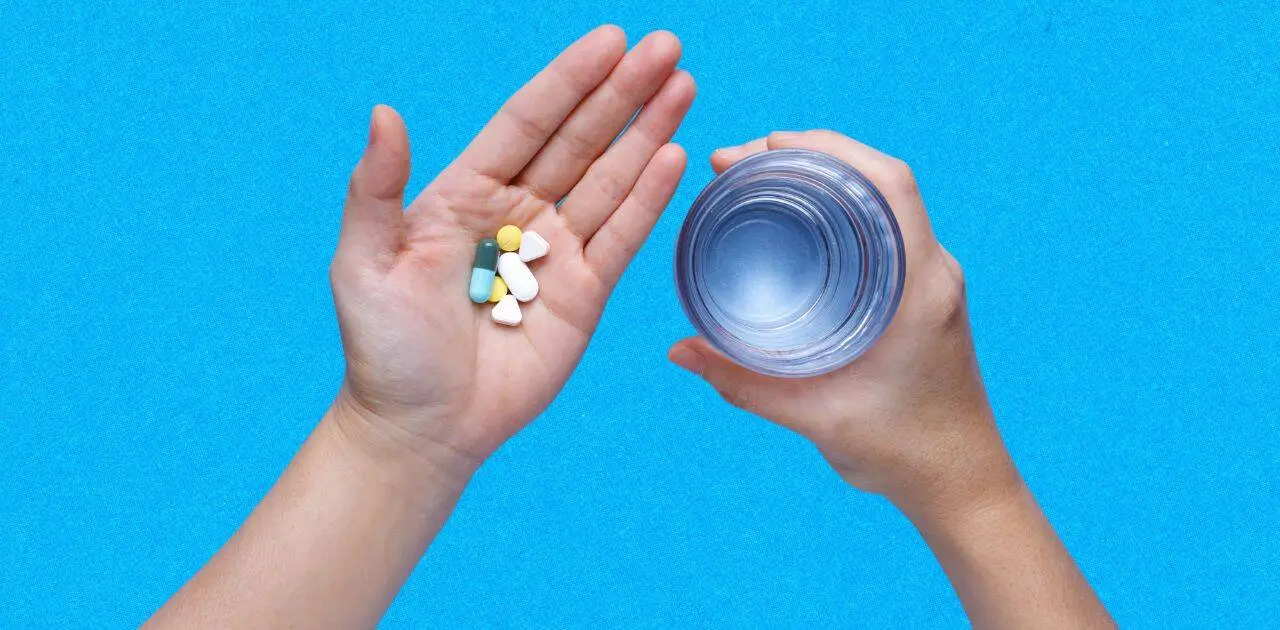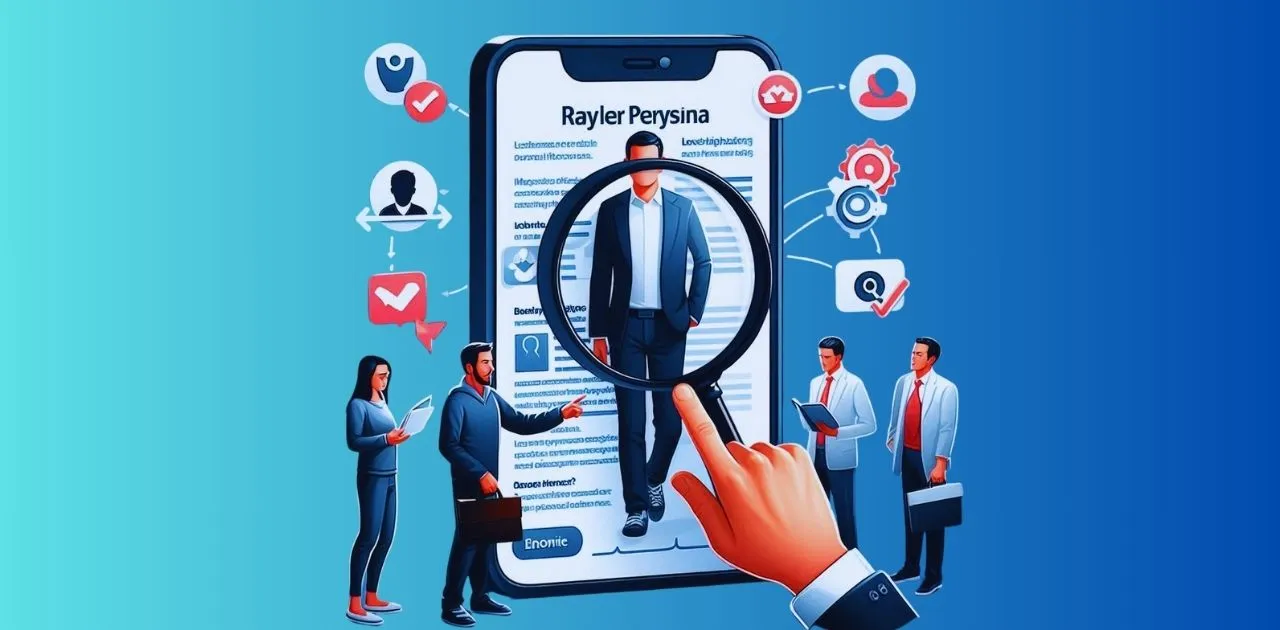Nowadays, anxiety disorders are mostly affecting millions of young people. Those who suffer from anxiety disorders suffer from the tempest symptoms such as trembling, panic attacks, rapid heartbeat, and sweating.
Therefore, entering the realm of non habit forming anxiety medication is a beacon of hope and a remedy that could offer respite without the shackles of habit.
Anti-anxiety medication is one effective treatment for anxiety disorders, but certain patients have a problem with substance use, which can lead to the risk of addiction.
Anxiety no longer has to rule your life; with the proper treatment and the correct intake of non-addictive anxiety medication, you can take control back.
Table of Contents
Anxiety and its Treatment
Anxiety refers to feelings of uneasiness, dread, and fear. It is a normal reaction to stress. It results in a rapid heartbeat, tense feelings, and restlessness, as well as frequent sweating.
Anxiety can indeed lead to panic attacks, although not everyone who experiences anxiety will have panic disorders.
A mild level of anxiety can be beneficial in various situations. For instance, anxiety faced before giving a test or facing a difficult situation can help you to cope with the tension. It helps people prepare and pay attention, and it also boosts their energy.
The causes of anxiety disorders are unknown, as various factors, including genetics, stress, environment, brain biology, and chemistry, may play a role. The treatment may include both habit-forming and non-habit forming anxiety medications.
Furthermore, the distinction between a habit and an addiction is necessary to understand the habit-forming potential of anti-anxiety medications.
Treatment – Benzodiazepine and its Risks
Benzodiazepines are often prescribed for the short-term treatment of anxiety. In the 1960s, it was introduced as a more secure alternative treatment for anxiety disorder treatment, and since then, it has become the most widely prescribed class of psychoactive drugs globally.
The long-term use of benzodiazepines also has some risk factors. It is known to cause dependence and addiction as it causes the release of a calming neurotransmitter called GABA (gamma-aminobutyric acid). The reliance on this medication makes it challenging to quit while showing withdrawal symptoms as well.
Insomnia, seizure, and anxiety are caused once the intake of benzodiazepines is abolished. Long-term use of this medication can result in impaired memory, increased risks of accidents, and cognitive impairment.
Thus, this situation gave rise to one question: is there a non-habit-forming anxiety medication?
Yes, there are other non habit forming anxiety medications, and they do not have the same potential of forming habits as benzos.
What is Non Habit Forming Anxiety Medication?
While some medications used to treat anxiety result in habit formation or addiction, some alternatives are non-habit forming. Patients who have a history of addiction or easily form habits should avoid those medications. They should consider these non habit forming anxiety medications.
When patients with anxiety consult the doctor, the doctor sees what type of anxiety disorder the patient has and also any mental or medical conditions they have suffered. By considering these factors, the doctor may prescribe the following best non habit forming anxiety medications.
Best Non Habit Forming Anxiety Medication
The best-known non habit forming anxiety medications are:

1. SSRIs
The least addictive anxiety medication, Selective Serotonin Reuptake Inhibitors, is a class of drugs that are originally manufactured for the treatment of depression and include non-additive antidepressants. However, it also proves most efficient in the treatment of anxiety.
Just like trazodone’s habit-forming potential, it is one of the least habit-forming and addictive treatment options.
These drugs work best by increasing the amount of serotonin in the brain, which ultimately causes a mood-boosting effect and regulates appetite and other bodily functions.
The most common non habit forming anxiety medications that are included in this drug class are:
- Sertraline (Zoloft®)
- Citalopram (Celexa®)
- Fluvoxetine (Prozac®)
- Escitalopram (Lexapro®)
- Paroxetine (Paxil®)
Certain drawbacks may exist, as it takes 4-6 weeks for these medications to work optimally and develop positive effects. Stopping the usage abruptly can cause undesirable effects such as nausea, vertigo, chills, shock sensations, or visual disturbances.
2. SNRIs
Selective Norepinephrine Reuptake Inhibitors (SNRI) are similar to SSRIs, and these are also the least addictive anxiety medications. Both of these classes are very effective in the treatment of generalized anxiety disorders and panic disorders. They play a similar role to SSRIs in boosting the level of serotonin along with norepinephrine.
Norepinephrine, noradrenaline, is a neurotransmitter that plays a role in attention, arousal, alertness, and concentration, and it also has a robust and positive effect on mood.
The most commonly prescribed SNRI medications are:
- Venlafaxine (Effexor®)
- Duloxetine (Cymbalta®)
Just like SSRIs, SNRIs also show similar drawbacks. SNRIs also show withdrawal effects when stopped abruptly. In addition to those, it may also cause constipation, loss of appetite, and fatigue.
3. Buspirone (Buspar)
Another non-habit forming anxiety medication is Buspar. It has become increasingly popular in recent years in the treatment of generalized anxiety disorder. It is the second-line treatment for GAD, and first and foremost is SSRIs. It also works similarly to SSRIs; both increase chemical messengers, including serotonin receptors.
Buspar works a bit differently. It only affects one specific part of the brain, whereas SSRIs affect multiple receptors. As Buspar affects only particular areas of the brain, it has fewer side effects.
Although Buspar is a non-addictive anxiety medication, still, some specific side effects that are experienced in this include lightheadedness, sleep problems, nausea, drowsiness, and sore throat.
4. Beta Blockers
Beta-blockers are traditionally used for treating high blood pressure and heart diseases and can also be used for treating anxiety and social phobias. They are used for a variety of medical conditions and are sometimes used “off-label” (without FDA approval) for the treatment of anxiety symptoms.
Catecholamines trigger many physical symptoms of anxiety, but beta-blockers work by blocking these chemicals. It also blocks the effect of adrenaline; symptoms such as shaking hands and rapid heartbeat are reduced. Adrenaline is a hormone that modulates fight-or-flight response.
Beta-blockers don’t change the chemical balance of your brain, so they aren’t used for long-term treatment. The non-addictive anxiety medication, i.e., beta-blockers prescribed to treat anxiety, are:
- Atenolol (Tenormin®)
- Acebutolol (Sectral®)
- Propranolol (Inderal®)
Therefore, beta blockers are also categorized as non-habit-forming anxiety medication.
5. Hydroxyzine
Hydroxyzine Pamoate, also known as Vistaril®. It is an antihistamine drug that is commonly used for the treatment of environmental allergies and itching. It is sometimes used off-label to treat GAD (generalized anxiety disorders).
It helps reduce anxiety symptoms in the short term by lowering the activity in the central nervous system. Moreover, it has sedative, hypnotic, and antiemetic effects. It helps balance neurotransmitters in the brain, including histamines and serotonin, which are involved in mood regulation.
Hydroxyzine is a non habit forming anxiety medication. However, it may cause side effects such as dry mouth, dizziness, and drowsiness.
6. Pregabalin and Gabapentin
These two medications are used for treating seizures. But they are also used off-label to treat GAD (Generalized anxiety disorders).
- Pregabalin (Lyrica®)
- Gabapentin (Neurontin®)
These both are Used for anxiety disorders. Lyrica has been shown to be effective in rapidly improving the psychological and physical symptoms of generalized anxiety disorders. Whereas Neurontin has a more favorable risk-to-benefit ratio than Lyrica for the treatment of GAD.
They are non-addictive anxiety medications and also have certain side effects, including dizziness, sexual dysfunction, visual disturbances, weight gain, dry mouth, fatigue, and lethargy.
Alternative Treatments for Anxiety
It is always recommended to use non-pharmacological treatments for anxiety disorders. Even when the patients are taking non habit forming anxiety medications, adding alternative therapies for anxiety is helpful for better treatment outcomes. Some of these treatments include:
1. Exercise
Regular exercise is beneficial in providing various health benefits, including treating chronic diseases and improving mental health. The physical symptoms of stress or anxiety are basically caused due to “fight-or-flight” responses caused by adrenaline hormones.
Developing exercise habits helps burn stress chemicals and promote relaxation. Physical activity is very helpful in managing stress and anxiety. Those who are suffering from anxiety disorders should develop a routine of exercising at least 3-4 times a week.
According to research conducted by Lund University, Sweden, physical activity is helpful in general to minimize anxiety and is one of the anti-anxiety treatments. There are certain gender differences, such as men tend to reduce anxiety regardless of the time they spend, whereas women tend to experience less chance of developing anxiety with lower intensity.
2. Nutrition
The nutritionist composition of the foods you intake affects the level of anxiety to a greater extent. For instance, mineral magnesium is helpful in relaxing muscle tissues, whereas its deficiency is one reason that causes anxiety, depression, and insomnia.
Nicotine, caffeine, and stimulant drugs like those that contain caffeine should be avoided as these products trigger the release of adrenaline, which is the reason causing anxiety as it is a stress hormone.
Vitamin B and calcium can also stimulate anxiety symptoms. Therefore, an anxiety patient’s diet plan should include more wholegrain cereals, low-fat dairy products, and leafy green vegetables.
3. Herbs
Herbal treatment includes taking parts of the plant, such as its roots, leaves, or seeds, and then they are processed for treatments of chronic diseases and allergies. It comes in different forms, such as tea, capsules, pills, lotions, or powders.
It is claimed that herbal supplements can help in reducing anxiety and stress. Studies show that there are certain natural products, including kava, melatonin, and chamomile, that help in reducing anxiety symptoms. You can also learn is melatonin habit-forming?
Although this alternative way may help in minimizing anxiety, it should be considered well before its intake. It is suggested to consult a healthcare professional before taking any herbal supplement, as it can invoke certain side effects as well.
4. Aromatherapy
Aromatherapy involves the inhalation or topical application of essential oils extracted from plants to promote physical or psychological well-being. Smelling soothing plants and essential oils can help reduce stress and anxiety.
According to different researches conducted on the effects of aromatherapy on anxiety show that rose water essential oils help minimize the level of anxiety in patients. Moreover, lavender and chamomile have been found to have a stress-reducing and calming effect, providing relief from anxiety symptoms.
Different scents are used to treat anxiety problems, including Ylang Ylang, Grapefruit, Lavender, Clary Sage, Bergamont, and Chamomile.
Conclusion
To sum up the discussion, it can be claimed that besides Benzodiazepines, which are used to treat anxiety but are addictive, there are certain other non habit forming anxiety medications. These include different groups of drugs such as SSRIs, SNRIs, Beta Blockers, Buspirone, Hydroxyzine Pamoate, Pregabalin, and Gabapentin.
Besides these non-habit forming anxiety medications, patients can use alternative methods for treating anxiety. The methods pace up the treatment of anxiety, including aromatherapy, nutrition, herbal supplements, and exercise.
FAQs
Which is the least addictive anxiety medication?
People having a history of addiction may find relief from anxiety by taking these non-habit forming anxiety medications, including PanX, Diphenhydramine, SNRIs, SSRIs, beta-blockers, and others. These are the least addictive anxiety medications.
What are the long-term anti-anxiety medications?
Certain SSRIs can be taken for the long term. These include:
Celexa®
Lexapro®
Prozac®
Zoloft®
Paxil®
All these are non-habit forming anxiety medications.
Is it safe to take anti-anxiety medication every day?
Although certain classes include non-addictive anxiety medication, they should not be taken every day. The reason for not taking these medications every day is that they can have specific side effects that can worsen for taking these medicines daily. The dosage should be taken according to your physician’s prescription.




